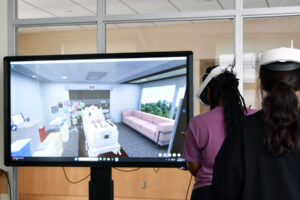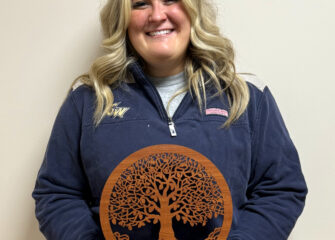
New nurses must be able to handle crises, but even with a range of experiences in clinical rotations, rare emergency cases aren’t known for showing up at convenient times. Enter virtual reality, the newest tool for students in the nursing program at Wor-Wic Community College. Using Meta Quest headsets, students enter elaborate clinical scenarios controlled by their instructors. The experience is immersive and realistic: They can speak with the virtual patient, call a doctor, administer medications, rifle through bedside drawers, adjust the bed and take vital signs.
“You can feel the pulse in the hand controls and listen to breathing sounds through the headset,”said Amanda Harding, who earned her nursing degree in August.
As someone who worked as emergency room tech on her way to becoming an ER nurse, Harding says the virtual scenarios held up to real-life experiences and let her practice in a safe way so she would be ready to handle whatever medical challenges her flesh-and-blood patients present. “We’ve had chest tube scenarios and code blues,” she said.
Kari Abubakker, an instructor of nursing at Wor-Wic, says it is a useful tool that gives students extra knowledge alongside
their hands-on clinical rotations and classroom experience. “It has gotten rave reviews from faculty,” she said. “The instructors can alter the scenarios to see how students react to changes in the patient’s status.”
While part of the class interacts through the headset, their classmates can observe on a screen in the room and take notes for their turn with a virtual patient.
“Students in our program have a lot of varied experiences in clinical rotations, but this lets us present those few-and-far-between scenarios in a controlled environment,” Abubakker said. “Anaphylaxis, for example – a major allergic reaction. When it happens, you have to be prepared. This helps give them the muscle memory they need to react quickly.”
Instructors in the nursing program can use the tool to give beginning nursing students confidence and experience before encountering real patients, or give experienced students those rare cases so they’re ready to step into a job after graduation. “It is a great tool to have for our students,” Abubakker said.



